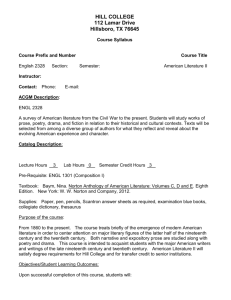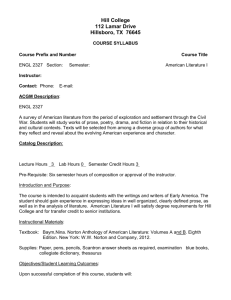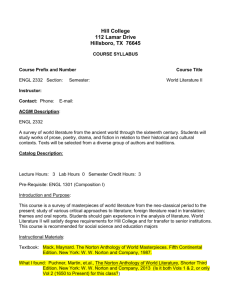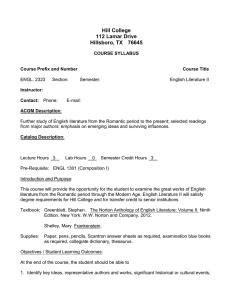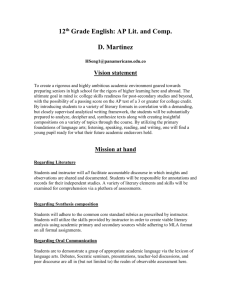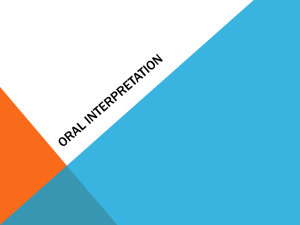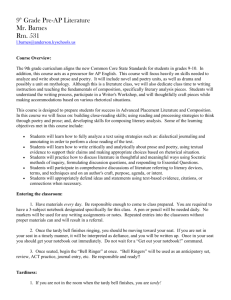British Literature I
advertisement
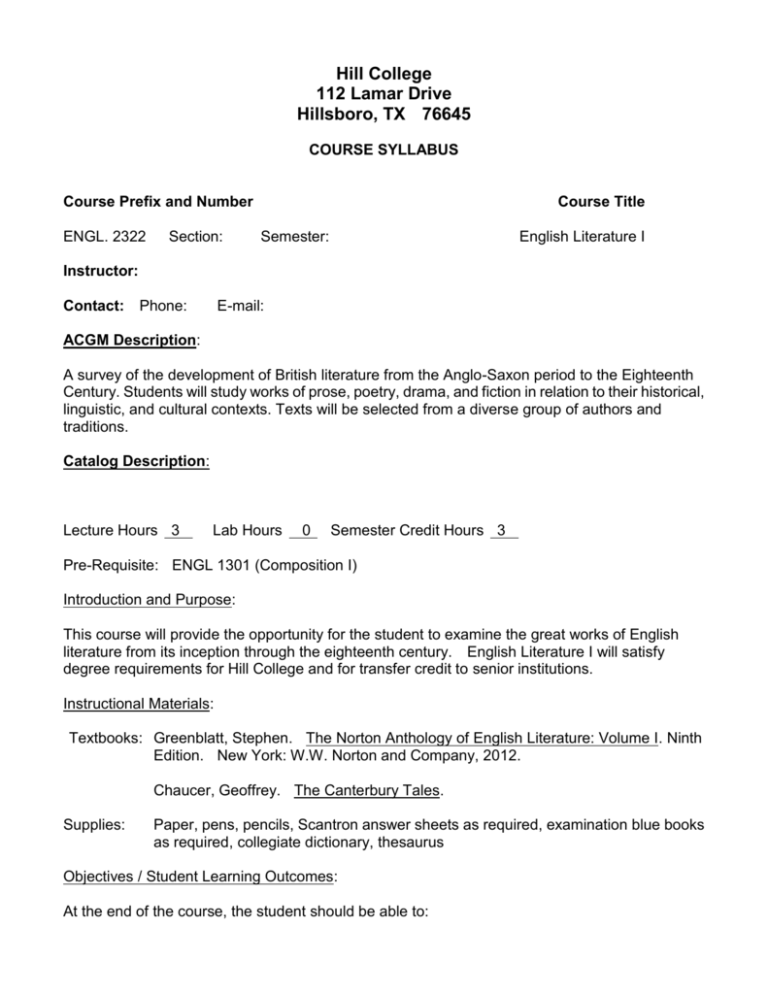
Hill College 112 Lamar Drive Hillsboro, TX 76645 COURSE SYLLABUS Course Prefix and Number ENGL. 2322 Section: Course Title Semester: English Literature I Instructor: Contact: Phone: E-mail: ACGM Description: A survey of the development of British literature from the Anglo-Saxon period to the Eighteenth Century. Students will study works of prose, poetry, drama, and fiction in relation to their historical, linguistic, and cultural contexts. Texts will be selected from a diverse group of authors and traditions. Catalog Description: Lecture Hours 3 Lab Hours 0 Semester Credit Hours 3 Pre-Requisite: ENGL 1301 (Composition I) Introduction and Purpose: This course will provide the opportunity for the student to examine the great works of English literature from its inception through the eighteenth century. English Literature I will satisfy degree requirements for Hill College and for transfer credit to senior institutions. Instructional Materials: Textbooks: Greenblatt, Stephen. The Norton Anthology of English Literature: Volume I. Ninth Edition. New York: W.W. Norton and Company, 2012. Chaucer, Geoffrey. The Canterbury Tales. Supplies: Paper, pens, pencils, Scantron answer sheets as required, examination blue books as required, collegiate dictionary, thesaurus Objectives / Student Learning Outcomes: At the end of the course, the student should be able to: 1. Identify key ideas, representative authors and works, significant historical or cultural events, and characteristic perspectives or attitudes expressed in the literature of different periods or regions. 2. Analyze literary works as expressions of individual or communal values within the social, political, cultural, or religious contexts of different literary periods. 3. Demonstrate knowledge of the development of characteristic forms or styles of expression during different historical periods or in different regions. 4. Articulate the aesthetic principles that guide the scope and variety of works in the arts and humanities. 5. Write research-based critical papers about the assigned readings in clear and grammatically correct prose, using various critical approaches to literature. Description of Institutional Core Objectives (ICO’s) Given the rapid evolution of necessary knowledge and skills and the need to take into account global, national, state, and local cultures, the core curriculum must ensure that students will develop the essential knowledge and skills they need to be successful in college, in a career, in their communities, and in life. Therefore, with the assistance of the Undergraduate Education Advisory Committee, the Coordinating Board approved a 42-semester credit hour core curriculum for all undergraduate students in Texas, including a statement of purpose, six core objectives, and common component areas. Statement of Purpose Through the Texas Core Curriculum, students will gain a foundation of knowledge of human cultures and the physical and natural world, develop principles of personal and social responsibility for living in a diverse world, and advance intellectual and practical skills that are essential for all learning. Hill College faculty periodically evaluates the objectives included in the Foundational Component Area of Language, Philosophy, and Culture. Core Objective College SLO Critical Thinking Skills Communication Skills Use Any CT1: Generate and communicate ideas by combining, changing or reapplying existing information CS1: Develop, interpret, and express ideas through written communication Communication Skills Use Any CS2: Develop, interpret, and express ideas through oral communication Course SLO 1-4, 8-9 General Learning Activities Assessment Pre-writing, brainstorming, outlining, class and group discussion 1-4, 8-9 Pre-writing, brainstorming, outlining, writing multiple drafts to conclude with a final draft 1-3, 7-8 Pre-writing, brainstorming, outlining to conclude with an oral and visual presentation Embedded assessment analysis, written essays and research papers Embedded assessment analysis, written essays and research papers Embedded assessment analysis, student presentations Communication Skills Use Any CS3: Develop, interpret, and express ideas through visual communication 3, 7-9 Social Responsibility Use Any SR1: Demonstrate intercultural competence 4, 5, 6 Social Responsibility Use Any Social Responsibility Use Any SR2: Identify civic responsibility 1-2, 7, 8 SR3: Engage in regional, national and global communities 3, 7 Personal Responsibility PR1: Evaluate choices and actions and relate consequences to decision-making 1-9 Pre-writing, brainstorming, outlining to conclude with a visual presentation Embedded assessment analysis, power point presentation Class discussion, student Students' presentations contribution to discussion and listening to other students Class discussion, student Class discussion of presentations, community importance of volunteer hours volunteering Use research and blog with Embedded students from various countries assessment analysis with varying cultural belief and research paper systems Class discussion, writing from Embedded a different point of view, assessment creating a cause/effect analysis analysis, cause and effect essay The students' success in completing these objectives will be measured using a set of examinations and assignments described, in detail under the section of this syllabus headed “Method of Evaluation.” An Annual Assessment Plan will be implemented each year to review the course. Methods of Instruction: This course will be taught face-to-face and by various distance learning delivery methods. Audio-visual materials and computer-based technology will be used when appropriate. Students will be shown how to use a calculator where appropriate. Methods of Evaluation: The students' success in completing the core objectives within the Foundational Component Area of Language, Philosophy, and Culture will be measured using rubric, exam, or embedded assessment activity. Grades in this course will be based on the following evaluative criteria: 1. Tests Tests must be given for each major period studied. At least 4 major tests must be given during the semester. 2. Analytical papers based on specific literary works and/or oral presentations. At least two major papers and/or oral presentations should be assigned during the course of the semester. 3. Quizzes/short in-class written responses The number of quizzes/written responses should be left to the instructor’s discretion. ***Elements 1-3 will be weighted at 75% of the overall grade, but can be distributed at the instructor’s discretion. 4. Comprehensive final examination ***The final exam will be weighted at 25% of the overall grade. Letter grades for the course will be based on the following percentages: 90-100% 80-89% 70-79% 60-69% Below 60% A B C D F Course Outline: Class policies: Regular attendance at all class meetings is expected. Disruptions in class will not be tolerated. Outline of Topics: I. II. III. Background to England and its language A. Origins of early English inhabitants B. Origins of language Old English period (Anglo-Saxon) A. Historical background B. Development of early language 1. Celtic language and culture 2. Contributions of Jutes, Angles, and Saxons 3. Influence of Viking raiders and invaders C. Early literary achievements (selected from below) 1. Beowulf 2. "The Wanderer" 3. "The Seafarer" 4. Caedmon and Bede's Ecclesiastical History 5. "The Battle of Maldon" 6. "The Dream of the Rood" Middle English period A. Historical background 1. Norman invasion 2. Rise of feudalism 3. Cultural changes B. Language changes 1. French infusion with Norman invasion 2. Latin influence with the Church 3. Growing dominance of English as a language C. Major literary achievements of period (selected from below) 1. The Canterbury Tales 2. Sir Gawain and the Green Knight 3. Piers Plowman 4. Medieval lyrics and ballads 5. Everyman 6. Morte d'Arthur IV. V. The Sixteenth Century A. Historical background 1. Political changes 2. Religious changes 3. Social shifts 4. Philosophical growth 5. Knowledge explosion B. Language 1. Influx of new vocabulary 2. Use of new literary structures and techniques 3. General emphasis of creativity with language C. Major literary achievements (selected from below) 1. Poetry a. Sonnets b. Lyrics/other short poems c. Faerie Queene d. Astrophil and Stella e. Skeltonics 2. Prose a. Utopia b. Biblical translations 3. Drama a. Dr. Faustus b. Shakespearean play selection The Seventeenth Century A. Historical development 1. Puritans 2. Cavaliers 3. The Commonwealth B Literary achievements (selected from below) 1. Metaphysical poetry 2. Cavalier poetry 3. Puritan poetry a. Paradise Lost b. Other selections 4. Prose a. Essays b. John Locke VI. The Restoration and the Eighteenth Century A. Historical development 1. Government 2. Society B. Language development C. Literary achievements (selected from below) 1. Prose a. Pepys' Diary b. Pilgrim's Progress c. Swift's satire d. Journalism e. Life of Johnson f. Johnson's English dictionary 2. Poetry a. The Rape of the Lock b. Selections by John Dryden c. Pre-Romantic poetry Disabilities/ADA Reports of discrimination based on disability may be directed to the ADA/Section 504 coordinator. The College District designates the following person to coordinate its efforts to comply with Title II of the Americans with Disabilities Act of 1990, as amended, which incorporates and expands the requirements of Section 504 of the Rehabilitation Act of 1973, as amended: Name: Dr. Heather Kissack Position: Executive Director of Human Resources Address: 112 Lamar Drive, Hillsboro, TX 76645 Telephone: (254) 659-7731 Students with qualified and documented disabilities may request accommodations which will enable them to participate in and benefit from educational programs and activities. Students should contact the Academic Advising and Student Success Center for more details at: 254 659 7650 for Hillsboro, 817 760 5650 for Cleburne, or 817 295-7392 for Burleson. EEO Statement Hill College is committed to the principle of equal opportunity in education and employment. The college does not discriminate against individuals on the basis of age, race, color, religion, sex, national origin, disability, or veteran status in the administration of its educational programs, activities, or employment policies. Instructor’s Class Content:
